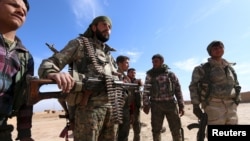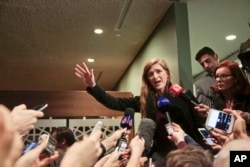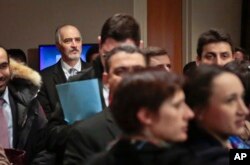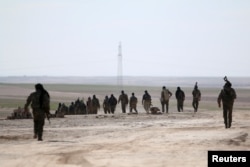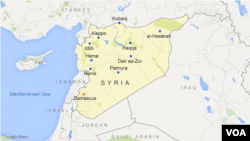A human rights monitor says the death toll from double blasts in the central Syrian town of Homs has risen to 46 people with dozens more wounded.
The Britain-based Syrian Observatory for Human Rights says the twin explosions Sunday struck the al-Zahraa neighborhood and most of those killed appeared to be civilians.
Homs has been the target of multiple attacks in recent months, killing and wounding scores of people. The Observatory said the blasts Sunday were among the largest to hit the neighborhood in the five-year-old civil war.
There has been no claim of responsibility for the deadly attack, which comes a day after U.S. Secretary of State John Kerry and Russian Foreign Minister Sergei Lavrov conferred on the crisis in Syria by telephone.
The main rebel coalition in Syria has said it is willing to accept a temporary truce, but only if Russia calls a halt to its airstrikes and the Damascus government ends its offensive near the Syrian-Turkish border.
There was no indication Kerry and Lavrov made any significant progress on the truce issue.
Russia has said it will not stop its airstrikes against what it calls terrorist targets in Syria, even if there is international agreement on a temporary truce, which diplomats have been calling a "cessation of hostilities." The United States and others involved in trying to end the Syrian civil war say most Russian bombs are directed at rebels fighting the Syrian government, not at Islamic State terrorists.
U.S. officials gave a guarded account of Kerry and Lavrov's conversation Saturday, which reviewed the work of two teams working in Geneva on the Syrian crisis — one on the urgent need to get humanitarian assistance to civilians trapped by the war, the other on a temporary truce intended to lead to a full and formal cease-fire.
Both sides agreed there has been some progress in delivering aid to civilian neighborhoods under siege by Syrian government troops and their allies. A U.S. statement added that humanitarian groups need immediate access to additional areas, and that future deliveries should be "sustained and unimpeded."
Truce points
On the truce issue, a spokesman for Kerry said the U.S. secretary and Lavrov discussed "developing a draft set of modalities for a cessation of hostilities." He added: "Those modalities are not yet agreed upon."
The Russian Foreign Ministry's version of the Kerry-Lavrov conversation was similar to the statement issued in Washington, except that it said a "cessation of hostilities" would not stop "the fight against terrorists" — Russia's around-the-clock aerial bombing campaign in northern Syria.
“Everyone recognizes the complexity of this endeavor, and there is certainly a lot more work to do,” Kerry said in London, where he met with senior British officials early Saturday. Kerry later flew to Jordan for more talks about Syria, including an expected meeting with King Abdullah on Sunday.
A coalition of Syrian rebel groups meeting in Saudi Arabia on Saturday condemned Russia's military action supporting the Damascus government.
The coalition, known as the High Negotiations Committee, said Russia has "shown disdain for the international community and disregard for the lives of Syrians."
The Russian air campaign also has been blamed for increasing the war's toll on Syrian civilians, prompting more of them to become refugees and try to flee across the border into Turkey.
Russia's UN request rejected
Moscow has complained that Turkey is about to send ground forces into Syria, and it called for Security Council action to block that at an emergency meeting Friday.
Other Security Council members rejected Russia's draft resolution, and Turkey's U.N. ambassador said his country would take such a direct role in Syria only if it was backed by the United Nations.
Russia's proposal to the Security Council did not mention Turkey by name, but its intent was clear. It strongly condemned cross-border shelling into Syria and what Russia says is an unrestricted flow of "terrorist" fighters and illegal weapons shipments into the country.
Russia's resolution 'a distraction'
Diplomats said at least six of the 15 council members rejected the resolution outright when it was presented, and only one member — Venezuela — expressed support. Even China, which frequently aligns its position with Russia, appeared to be reluctant to side with Moscow; China's U.N. delegates said they were awaiting for instructions from Beijing for the time being.
The Kremlin said Russia has a "consistent, transparent, and clear policy aimed at securing stability" in the Syria and the wider region.
“What’s really important is that rather than trying to distract the world with the resolution they just laid down, it would be really great if Russia would implement the resolution it’s already agreed to,” U.S. Ambassador Samantha Power said.
Power referred to Security Council Resolution 2254, adopted in December, which laid out a framework for starting political talks in parallel with a nationwide cease-fire in Syria.
“We have a resolution on the books. It’s the right resolution. We’ve committed ourselves to it, and we need Russia to do the same,” she added.
Turkey’s U.N. envoy, Yaşar Halit Çevik, dismissed Russia's concern that Ankara might be planning to launch a ground operation in Syria.
“Our political leaders are quite open on saying that Turkey will not be going into Syria with boots on the ground if it is not a collective action,” Çevik told reporters, and said Turkey would only consider military intervention if the Security Council or the international coalition called for it.




